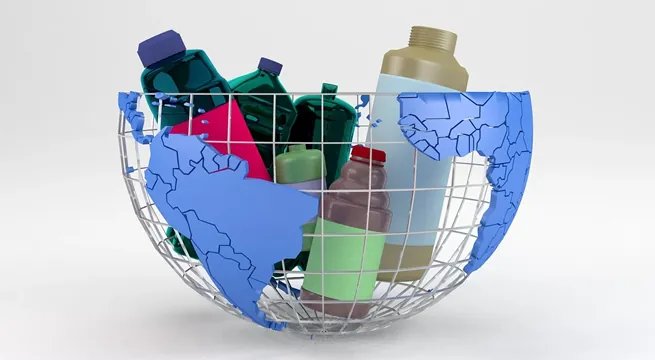
Researchers Unveil Revolutionary Enzyme Set to Transform Plastic Recycling!
2025-01-03
Author: Sarah
SEOUL, Jan. 3 — A groundbreaking scientific advancement is on the horizon as a team of researchers led by Professor Kyung-Jin Kim from Kyungpook National University, alongside the innovative company CJ CheilJedang, has developed the world's most efficient enzyme for breaking down polyethylene terephthalate (PET) plastics.
On January 2, the Ministry of Science and ICT announced this monumental achievement, which is poised to revolutionize plastic recycling methods globally and significantly impact environmental sustainability.
Meet Kubu-P: The Future of Plastic Recycling
The newly engineered biocatalyst, aptly named Kubu-P, is specifically designed to target PET plastics, the primary material in countless everyday products such as water bottles, clothing fabrics, takeaway containers, and even car mats.
Unlike traditional mechanical or chemical recycling processes, which often lead to pollution and waste, Kubu-P breaks down PET into its pure components—ensuring minimal environmental impact while maintaining the integrity of the materials.
Remarkably, the researchers enhanced the enzyme's capabilities through advanced protein engineering, resulting in a powerful variant known as Kubu-PM12. This potent enzyme can decompose an astonishing 90% of 1 kilogram of PET within just eight hours using a mere 0.58 grams of the enzyme. This high-efficiency performance sets a new global benchmark in the field of recycling.
Overcoming Conventional Recycling Challenges
Traditional recycling approaches tend to compromise the quality of recycled materials, and the limitations of chemical recycling—exacerbated by contamination and environmental concerns—have further complicated effective waste management.
Kubu-P introduces a cleaner, more efficient solution, capable of processing contaminated plastics that would typically end up in landfills or be incinerated.
A Game-Changer for Global Sustainability
Professor Kim, reflecting on this remarkable development, stated that biological recycling is indeed a “game-changing technology.” He emphasized that this breakthrough not only highlights the extraordinary potential of nature's solutions but also serves as a catalyst for innovation across multiple chemical industries.
As the world grapples with a growing plastic waste crisis, the advent of Kubu-P emerges as a significant step towards sustainable recycling practices.
This pioneering biocatalyst may not only facilitate effective plastic waste management but could spark further innovations in biotechnological solutions that promote environmental sustainability.
With its exceptional performance and eco-friendly methodology, Kubu-P could redefine how we think about recycling and inspire a new wave of research aimed at tackling the challenges of plastic pollution head-on.
The future looks promising, and the potential benefits for our planet are undeniably vast!
 Brasil (PT)
Brasil (PT)
 Canada (EN)
Canada (EN)
 Chile (ES)
Chile (ES)
 Česko (CS)
Česko (CS)
 대한민국 (KO)
대한민국 (KO)
 España (ES)
España (ES)
 France (FR)
France (FR)
 Hong Kong (EN)
Hong Kong (EN)
 Italia (IT)
Italia (IT)
 日本 (JA)
日本 (JA)
 Magyarország (HU)
Magyarország (HU)
 Norge (NO)
Norge (NO)
 Polska (PL)
Polska (PL)
 Schweiz (DE)
Schweiz (DE)
 Singapore (EN)
Singapore (EN)
 Sverige (SV)
Sverige (SV)
 Suomi (FI)
Suomi (FI)
 Türkiye (TR)
Türkiye (TR)
 الإمارات العربية المتحدة (AR)
الإمارات العربية المتحدة (AR)